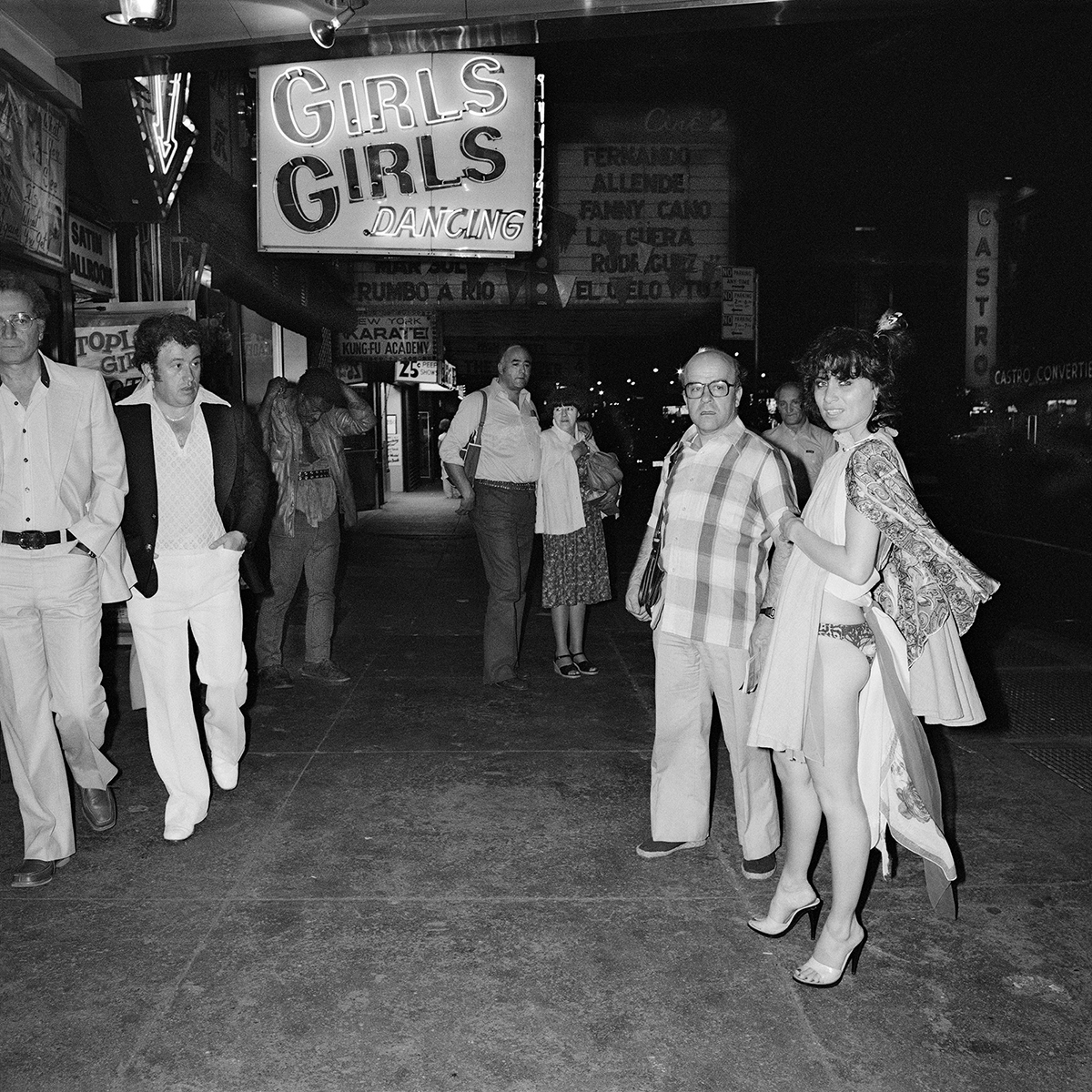Heady nights working in '70s New York go-go bars
- Text by Miss Rosen
- Photography by Meryl Meisler / ClampArt

In spring 1978, photographer Meryl Meisler accompanied her friend Judi Jupiter to an interview to work the bar at the Playmate, a new go-go bar opening on 49th Street and Broadway in New York.
“It was a topless-bottomless bar,” Meisler remembers. “There was disco music playing and girls were dancing on stage. It was fascinating. I asked if I could get a job there as a hostess, and was hired.”
During the late 1970s, Meisler led a double life. By day she worked as a CETA photographer documenting Jewish New York for the American Jewish Congress, exploring her heritage. By night, she was partying at nightclubs like Studio 54 and working at the Playmate, where she soon began making photographs, a selection of which have been published in Purgatory & Paradise SASSY ‘70s Suburbia & The City (Bizarre).
Meisler was required to wear a bathing suit or leotard, stockings, high heels, and makeup, and as hostess, she’d greet customers at the door, seating them by the stage, and serving them $4 “near-beers,” as the bar didn’t have a liquor license. She received a dollar tip for every drink, plus a $10 tip whenever she brought customers to the back rooms for private time with dancers and a $40 bottle of “champagne” (Martinelli’s sparkling cider).
“From time to time, customers would want to spend time with me in the back room,” Meisler says. “I would talk to them and draw them in a little sketchbook I carried. Nobody ever asked for their money back but I never had repeat customers.”

Byron Gives Judi Jupiters Flowers and Lets Smoke out his Nostrils NY, 1978
That December, Meisler and Jupiter left the Playmate and started working at Winks, another midtown go-go bar. After work, they’d go out with all the dancers to the Brasserie, an all-night coffee shop, to catch up over French onion soup.
“One of the women supported herself through medical school, another was buying a house. There was a big range of people. Some had drug problems, some had boyfriend problems, some were supporting kids and other family members. You couldn’t pigeonhole anyone.”
In July 1979, Meisler moved on to a third bar, Magic Carpet, which was painted red and featured a “Sultan’s Chambers”, a massive fish tank, and a swinger’s club upstairs.
That September, Meisler began working as a schoolteacher for the New York City Department of Education. “I hadn’t gotten my paycheck yet, so I continued working on the weekends at Magic Carpet. By November, my money came in, but it wasn’t a lot, so I kept on working in the clubs.”
“By early 1980, I stopped because I knew it was not appropriate for a schoolteacher to waitress at go-go clubs,” Meisler says.
The bars were also getting raided, and people started getting arrested by undercover police. “There were signs that said ‘don’t talk about money’, because it could be construed as prostitution – some people were getting higher tips that way,” remembers Meisler. “When Tina Turner sang ‘Private Dancer,’ I understood that.”

Self-Portrait Playmate Hostess NY, 1978

Playmate Hostesses Dressing NY, 1978

Judi Jupiter, Playmate Bartender NY, 1978

BURLESK GIRLS GIRLS GIRLS Byron, Judi Jupiter and friends NY, 1978

Poochie Wears her Shell Belt to Dance at The Magic Carpet NY, 1979

Girls, Girls, Girls, Dancing with Judi Jupiter in Times Square NY, 1978
Discover more of Meryl Meisler’s work here.
Follow Miss Rosen on Twitter.
Enjoyed this article? Like Huck on Facebook or follow us on Twitter.
Latest on Huck

Tender, carefree portraits of young Ukrainians before the war
Diary of a Stolen Youth — On the day that a temporary ceasefire is announced, a new series from photographer Nastya Platinova looks back at Kyiv’s bubbling youth culture before Russia’s February 2022 full-scale invasion. It presents a visual window for young people into a possible future, as well as the past.
Written by: Hannah Bentley

Analogue Appreciation: 47SOUL
Dualism — In an ever more digital, online world, we ask our favourite artists about their most cherished pieces of physical culture. Today, it’s Palestinian shamstep pioneers 47SOUL.
Written by: 47SOUL

Meet the hair-raised radicals of Berlin’s noise punk scene
Powertool — In his new zine, George Nebieridze captures moments of loud rage and quiet intimacy of the German capital’s bands, while exploring the intersections between music, community and anti-establishment politics.
Written by: Miss Rosen

Amid tensions in Eastern Europe, young Latvians are reviving their country’s folk rhythms
Spaces Between the Beats — The Baltic nation’s ancient melodies have long been a symbol of resistance, but as Russia’s war with Ukraine rages on, new generations of singers and dancers are taking them to the mainstream.
Written by: Jack Styler

Uwade: “I was determined to transcend popular opinion”
What Made Me — In this series, we ask artists and rebels about the about the forces and experiences that shaped who they are. Today, it’s Nigerian-born, South Carolina-raised indie-soul singer Uwade.
Written by: Uwade

Inside the obscured, closeted habitats of Britain’s exotic pets
“I have a few animals...” — For his new series, photographer Jonty Clark went behind closed doors to meet rare animal owners, finding ethical grey areas and close bonds.
Written by: Hannah Bentley

